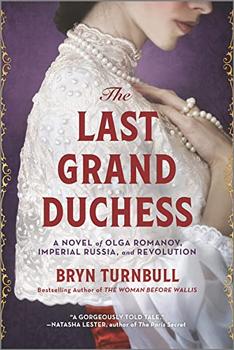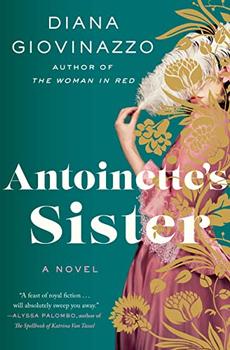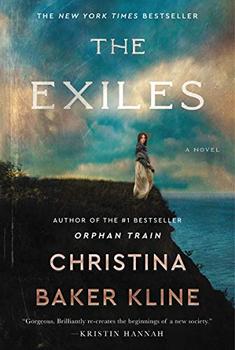Summary | Excerpt | Reading Guide | Reviews | Beyond the book | Read-Alikes | Genres & Themes | Author Bio

A Novel of Olga Romanov, Imperial Russia, and Revolution
by Bryn TurnbullOur First Impressions reviewers were impressed with Bryn Turnbull's historical novel The Last Grand Duchess, which narrates the story of Olga Romanov. The book scored an average rating of 4.6 out of 5 stars from the 30 respondents.
What it's about:
A unique portrayal of the Russian Revolution featuring the story of the Romanovs. Author Bryn Turnbull entrusts this well-known story to the Grand Duchess Olga Nikolaevna, eldest daughter of Nicolas II and Alexandra. Initially, Olga cherishes her life in the palace cocoon with her sisters and brother, extended family and titled friends. Gradually, she becomes uneasy and disenchanted with this suffocating world scripted for her and her siblings. Her parents seek out and trust Grigori Rasputin, a priest who is charged with a spiritual and healing role in her brother's life. She is troubled when she hears loyal Russian subjects challenge the authority of her parents. These life experiences cause an inner transformation which alerts Olga to the gravity of her family's situation as the Romanovs are consigned to exile. She is particularly angry at her father, who does not seek help for the family while there is still time (Carol S).
Readers appreciated the author's ability to bring the character of Olga Romanov to life:
Finally, a work of historical fiction that doesn't focus on Anastasia. Olga, the oldest daughter of the last Tsar of Russia, is presented as more than just another "royal"; instead, she is a thinking, wondering young woman whose expectations of a normal life will never happen. Based on multiple nonfiction sources, including Olga's diaries, the novel helps us examine, and maybe understand, how and why the Russian Revolution came about, from a purely personal perspective (Beverly D). It was refreshing to read historical fiction centered on Olga, as many books are written about Anastasia. Although she was thought to be less mature than other women of her age due to the seclusion imposed upon her and her sisters by their mother, Olga proved to be a strong and perceptive character (Gretchen M).
The novel is full of fascinating historical details that will interest even those who think they know the whole Romanov story:
Since I have read a number of the books listed in the bibliography, few of the facts of the Romanov story were new to me. However, learning about Jim Hercules and the small contingent of Black men who held court positions from before the time of Catherine the Great was new and fascinating information to me. As Turnbull points out, Jim was a sign of change: "The men who had held such positions in the past had come from Ethiopia—many of them not by their own choice...Jim, however, had applied for the post after leaving his home in Tennessee, preferring the sophistication of the Russian court—and the position's generous salary—to America's Jim Crow South" (Emily C). Books on the Romanovs, much like World War II, are everywhere. And while we all know the last chapter of this well-chronicled story, this particular book focuses specifically on the eldest Romanov daughter, Olga, and her coming of age. Clearly well-researched, this book is what all historical fiction strives to be: detailed, informative, entertaining and compelling. One hundred years after the fact, this story still has a haunting impact (Diana C).
Some found the shifting timeline a little confusing, while others appreciated this narrative device:
The book is written well and it held my attention, but the use of dual timelines (1917-1918 and 1913-1916, with a prologue in 1907 and an epilogue in 1952) distracted me a lot. I wonder how the novel would have worked if it had used just one timeline and not shifted from one to the other (Katheryn G). The last few chapters, with dates going back and forth between 1918 and 1916, were confusing. I think it was done to further the suspense, but I would have preferred that the book follow chronological order (Janet H). The story moves back and forth between 1913, 1918 and the years in between, providing glimpses of life in the various Romanov palaces, the country house at Tsarkoe Selo, and then throughout their exile. At first I found the shifting time frames a bit off-putting, but the technique helps to contextualize much of the drama that was unfolding in Russia in the early 20th century. It also provides an opportunity to introduce many characters who influence Olga (Helene M). I always love stories about the Romanov family and found this to be one of the best I have read. I liked how it went back and forth in the times of their lives. Excellent book (Barbara B).
Overall, readers appreciated the author's ability to make history come alive:
Even though I knew the end of the story of the Romanov family, the excellent writing kept me reading for hours at a time, just to find out what would happen next. Turnbull weaves a good story while, on the whole, remaining true to the historical record (Emily C). I could envision the events as told by Bryn Turnbull, who describes a different perspective on this time in Russian history. I enjoyed the author's rendition. I was eager to see how the plot unfolded. I will certainly read other works by Bryn Turnbull (Catherine V).
![]() This review
first ran in the March 2, 2022
issue of BookBrowse Recommends.
This review
first ran in the March 2, 2022
issue of BookBrowse Recommends.

If you liked The Last Grand Duchess, try these:

by Diana Giovinazzo
Published 2022
As Marie Antoinette took her last breath as Queen of France in Paris, another formidable monarch - Antoinette's dearly beloved sister, Charlotte - was hundreds of miles away, in Naples, fighting desperately to secure her release from the revolutionaries who would take her life. Little did Charlotte know, however, that her sister's execution would ...

by Christina Baker Kline
Published 2021
The author of the #1 New York Times bestseller Orphan Train returns with an ambitious, emotionally resonant historical novel that captures the hardship, oppression, opportunity and hope of a trio of women's lives - two English convicts and an orphaned Aboriginal girl - in nineteenth-century Australia.
Your guide toexceptional books
BookBrowse seeks out and recommends the best in contemporary fiction and nonfiction—books that not only engage and entertain but also deepen our understanding of ourselves and the world around us.